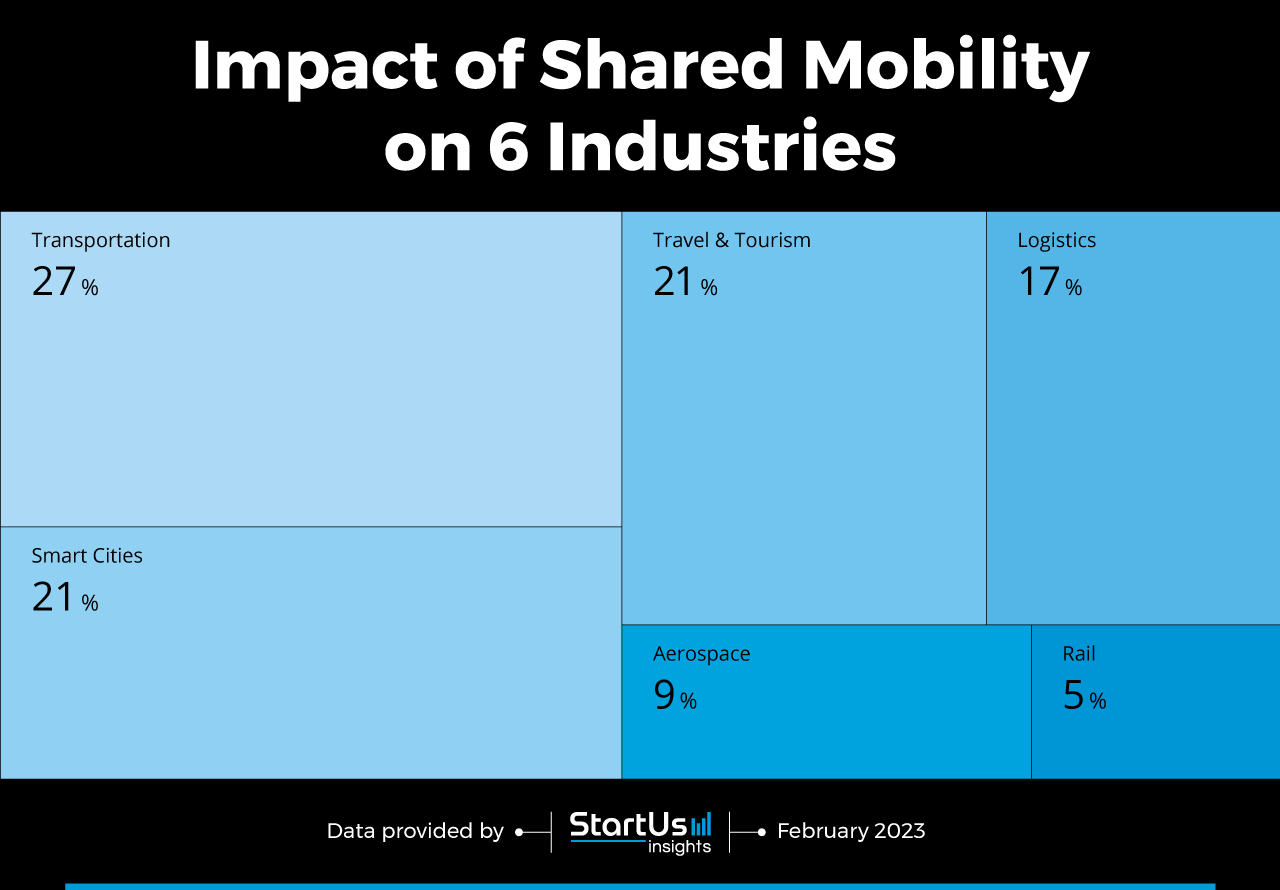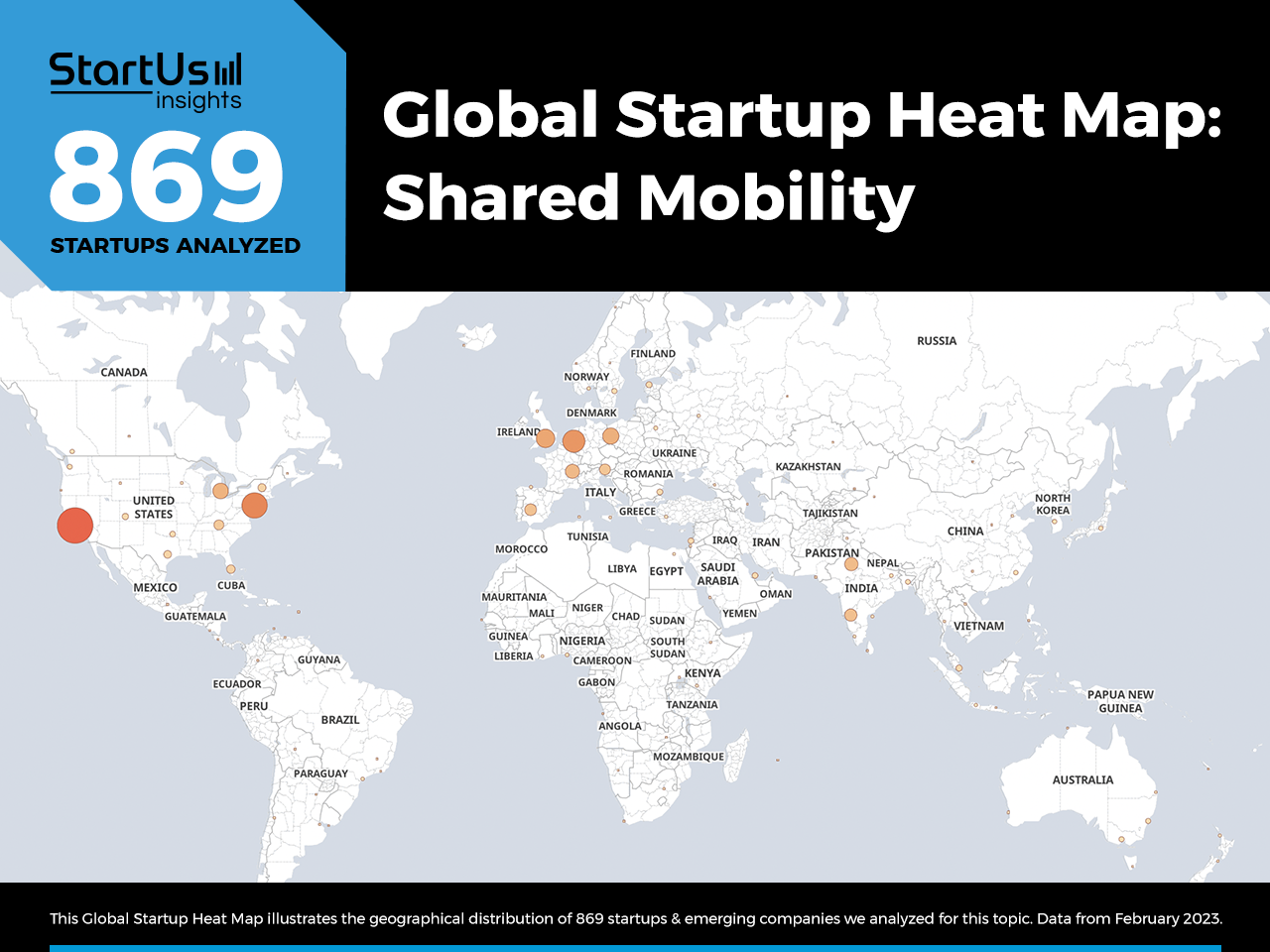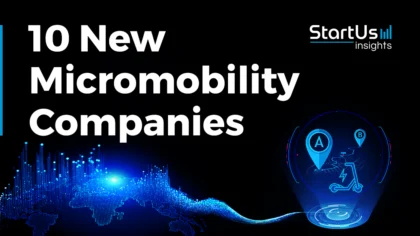Sustainability and traffic congestion are the critical drivers of shared mobility. However, this transportation model impacts various industries as it maximizes mobile asset utilization. To aid them, startups are developing solutions and services that allow businesses to integrate shared mobility quickly into their workflows. We give you insights into the top shared mobility examples based on our analysis of 869 companies and technologies.
They impact several industries such as transportation, smart city, and logistics. Read more to explore the impact of shared mobility on 6 industries and how they advance your business, despite new concerns for the sector arising after COVID-19.
Tree Map reveals the Top 6 Shared Mobility Examples across Industries
Based on the Innovation Map, the Tree Map below illustrates the impact of Shared Mobility on 6 industries in 2023 and 2024. Leveraging shared mobility allows transport companies to increase their asset utilization. On the other hand, cities and travel businesses utilize shared mobility to reduce the number of vehicles on roads and lower their carbon footprint.
Moving to shared mobility enables logistics companies to optimize fleets and reduce capital costs. The aerospace sector also expands its air mobility offerings through affordable inter-city air taxis. Lastly, rail businesses are integrating services and products to improve the efficiency of shared mobility options.
Global Startup Heat Map covers 869 Shared Mobility Startups & Scaleups
The Global Startup Heat Map below highlights the global distribution of the 869 exemplary startups & scaleups that we analyzed for this research. Created through the StartUs Insights Discovery Platform that covers 2 500 000+ startups & scaleups globally, the Heat Map reveals that the US has a high concentration of shared mobility startups, followed by Western Europe.
Below, you get to meet 6 out of these 869 promising startups & scaleups as well as the solutions they develop. These shared mobility startups are hand-picked based on criteria such as founding year, location, funding raised, & more. Depending on your specific needs, your top picks might look entirely different.
Interested to explore all 860+ shared mobility startups & scaleups?
Emerging Shared Mobility Examples across 6 Industries
1. Transportation
Shared transport companies leverage vehicle-sharing systems, ridesharing services, carpools, and micro-transits to deliver shared mobility to travelers. This approach reduces the number of vehicles in circulation and, thus, carbon emissions. To promote this, startups offer shared mobility solutions such as car-sharing and on-demand vehicle access platforms.
They allow people to book vehicles when required while enabling transport companies to optimize their vehicle fleets. Moreover, shared mobility increases asset utilization and streamlines profits for transport businesses. For people who leverage shared mobility, it saves vehicle-related expenses like insurance and maintenance costs.
3evi offers Hyperlocal Transport Options
3evi is an Indian startup that offers hyperlocal transport for passenger, goods, and freight movement and eCommerce fulfillment. The startup makes and operates three-wheel electric vehicles (EVs) as well as offers EV conversion kits for existing combustion vehicles. This allows transportation companies to transition to cleaner operations by leveraging 3evi’s electric fleet on demand.
2. Smart Cities
With the population in cities increasing, the number of private vehicles on roads will skyrocket and lead to traffic congestion. Besides, the emissions due to the increased number of vehicles affect the quality of life in cities. To mitigate these issues, cities promote shared mobility services like micro-transit and carsharing services.
City authorities are also optimizing other public transport sectors, like rail, to deliver flexible and effective services to travelers leveraging shared mobility. That is why many startups now develop multi-modal transportation solutions. Further, autonomous vehicle fleets will improve access to shared mobility assets and road safety.
Urban Mobility Tech provides On-Demand Micro-Transit
Urban Mobility Tech is a Thai startup that delivers on-demand micro-transit services for smart cities. The startup’s on-demand ridesharing platform, MuvMi, connects travelers with local drivers. It allows travelers to hire auto rickshaws for a day with a one-time upfront cost. This allows tourists and locals to leverage zero-emission transport at minimal expenses.
3. Travel & Tourism
Shared mobility is a necessary service for travelers and tourists visiting foreign countries. While they conventionally rely on taxi companies, the service charges of such services tend to be high. However, platforms, such as Uber and Ola, made hiring vehicles on demand easier and more affordable to travelers.
Startups further develop multimodal transportation planning solutions and information systems to improve their travel experience. Additionally, they enable travelers and tourists to better explore local places. Accessibility to roundtrip, one-way, and peer-to-peer (P2P) carsharing services also improves tourist mobility.
ATOM Mobility aids Vehicle Rental Service Launch
ATOM Mobility is a Latvian startup that helps businesses launch vehicle-sharing and rental services. The startup’s platform allows entrepreneurs to choose vehicle models and then pick their operating models, like rent type or P2P sharing. It also features customization, management dashboards, and third-party integrations.
This allows shared mobility service providers to mitigate in-house app development and quickly offer services to travelers and tourists. Further, the startup’s customer app ensures smooth digital onboarding experiences for tourists while automating ID verification.

4. Logistics
The best example of logistics companies leveraging shared mobility is the case of Zomato partnering with eBikeGo for electric scooters in its Indian market. This approach mitigates upfront capital expenses for logistics businesses and optimizes their operations. For instance, outsourcing last-mile delivery to shared mobility providers removes fleet management responsibility from logistics companies.
That is why many startups create ridesharing and on-demand ride services tailored for moving packages. This allows logistics companies to leverage shared mobility for their first, middle, and last-mile deliveries. Additionally, it lowers their carbon footprint and improves the cost-effectiveness of operations.
Viagoo enables On-Demand Logistics
Viagoo is a Singaporean startup that provides Viamove, a platform to enable on-demand, same-day, next-day, and international last-mile deliveries. It connects businesses to a crowdsourced network of couriers and delivery companies.
The platform also uses a distance-based algorithm to optimize delivery routes while providing detailed digital proof of deliveries. Additionally, its dashboard allows businesses to create, edit, and manage all deliveries. This allows companies to scale their logistics operations quickly and reduce capital expenses.
5. Aerospace
Conventional aircraft require intricate engineering and cost-intensive production and maintenance activities. This is reflected in the cost of airplane tickets, which are very expensive. Advances in battery technologies and vertical take-off and landing (VTOL) aircraft make air mobility cost-effective and more accessible.
Moreover, startups provide shared air mobility through electric VTOL, or eVTOL aircraft to offer emission-free air taxis. This allows airlines to mitigate the massive carbon footprint associated with short-haul flights as well as generate new revenue streams in countries that ban short hauls. Shared air mobility also impacts the development of integrated transportation systems.
LuftCar makes an Autonomous Air and Road Mobility (AARM) Vehicle
LuftCar is a US-based startup that develops a modular, autonomous air and road mobility (AARM) vehicle. It features eVTOL and an autonomous hydrogen fuel cell for flight as well as includes a detachable section for on-road navigation. This provides urban cities with zero-emission transit for shared cars or flights, thereby reducing travel time, road congestion, and wait time.
6. Rail
The rail industry primarily runs on the shared mobility model. Governments and businesses thus look to improve the services of rail networks with novel shared mobility solutions and ensure a better travel experience for passengers. Since trains are one of the most preferred mass transit modes, they offer better services tailored for shared mobility.
Such advantages will further increase passenger preferences for rail as a transport medium. Automatic train control systems, autonomous trains, and hyperloop systems play a significant role in aiding such efforts, optimizing rail transport networks, and reducing journey times.
MOOVE Network enables Multimodal Transport
MOOVE Network is a US-based startup that provides an integrated mobility platform for multimodal transport. It allows transport services and mobility service providers to interoperate by combining all transportation modes such as rail, buses, and taxis.
The platform then orchestrates multimodal trip planning, payment, and fulfillment by integrating with partner applications. As a result, travelers are able to discover wider mobility options while transport services reduce road congestion and increase asset utilization.
Discover All Shared Mobility Startups
Along with governments enforcing sustainability regulations, customer preferences in sustainable transport drive innovations in shared mobility. Autonomous vehicles, hyperloop, and air taxis will increase the adoption of shared mobility in cities. The adoption of shared mobility in non-urban areas is still limited due to a lack of ridesharing services and shared mobility platforms. However, startups are tackling this by offering hyperlocal mobility services. Shared mobility will further impact space travel and make it more cost-effective.








